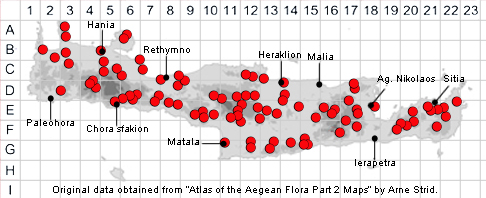
SPECIES DESCRIPTION
RUMEX TUBEROSUS subsp. CRETICUS
Family and Genus:- See- POLYGONACEAE/Subgen. ACETOSA
Common Names:- Tuberous dock
Homotypic Synonyms:- None
Meaning:- Rumex (L) A name used by the Roman naturalist and philosopher Pliny
for sorrel.
Tuberosus (L) Swollen, tuberous.
Creticus (L) From Crete, Cretan.
General description:- Dioecious perennial with a slightly woody stock and
several thick, tuberous roots.
Stems:-
1) 10-60 cm, ascending to erect, ridged, with long upper internodes.
Leaves:-
1) Basal and lower, long-petiolate, blade, usually 1.5-5 x l2.5 cm, sagittate to
cordate.
a) Cauline, fairly numerous, 2-6(-10) times as long as wide, with short basal lobes.
Flowers:-
1) Inflorescence, a branched raceme.
2) Valves, 3-8 x 3-8 mm, cordate-orbicular, reticulate-veined, with small tubercles.
a) outer perianth segments, deflexed in fruit.
Fruit:-
1) Achene, trigonous, often with a round tubercle on one or all three sides.
Key features:-
1) Cauline leaves, fairly numerous, 2-6(-10) times as long as wide, with short basal
lobes.
2) Roots, tuberous.
3) Valves, 8 x 8 mm., rounded at apex, suborbicular.
4) Inflorescence, usually dense.
5) Branches, repeatedly branched.
Habitat:- Dry open shrubby vegetation, deciduous scrub, olive groves and margins
of terraced fields. 0-1100 (-1700) m.
Distribution:- Aegean area and W Anatolia. Fairly widespread across Crete.
Flowering time:- Mar-June(-July).
Photos by:- Steve Lenton
